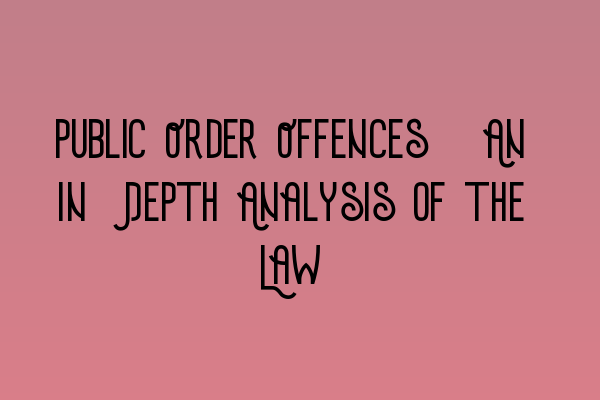Public Order Offences: An In-Depth Analysis of the Law
Gaining a comprehensive understanding of public order offences is crucial for anyone pursuing a career in criminal law. These offences encompass a wide range of actions that can disrupt public peace and harmony, and therefore, it is imperative to analyze the intricacies of these laws to navigate complex criminal cases effectively.
Understanding Public Order Offences
Public order offences are a category of offences that involve actions that could potentially disturb or endanger public order, safety, or morals. These offences are governed by various legislations and are enforced with the aim of upholding societal order and cohesion.
There are several key public order offences that criminal law practitioners should be well-versed in, including:
Analyzing the Legislation
Public order offences are primarily regulated by the Public Order Act 1986 in the United Kingdom. This act outlines the specific actions that constitute public order offences and the corresponding penalties involved.
Understanding the nuances of this legislation is crucial for lawyers specializing in criminal law. Familiarization with key elements such as the criteria for establishing guilt, available defenses, and the role of intent is imperative to effectively represent clients in public order offence cases.
Furthermore, an in-depth analysis of case law precedents is essential for a comprehensive understanding of how the courts interpret and apply legislation in real-world scenarios. Keeping abreast of recent judgments and legal developments ensures practitioners stay up-to-date and can make well-informed arguments in court.
Challenges and Considerations
Public order offences present unique challenges and considerations for criminal law practitioners. These offences often involve large groups of people, complex evidence, and the potential for escalating tensions.
Lawyers handling public order offence cases must possess strong advocacy skills, the ability to handle high-pressure situations, and effective negotiation techniques. Strategic planning and meticulous attention to detail are crucial to ensure the best possible outcome for clients.
It is also important to recognize potential human rights implications in public order cases. Balancing the preservation of public order with the protection of individual rights is a delicate task that requires a thorough analysis of the circumstances and a deep understanding of human rights law.
Conclusion
An in-depth understanding of public order offences is fundamental for criminal law practitioners. By familiarizing themselves with the relevant legislations, case law precedents, and the unique challenges these offences present, lawyers can navigate complex criminal cases effectively and provide the best possible representation for their clients.
For comprehensive preparation on criminal law and to enhance your chances of success in the Solicitors Qualifying Examination (SQE), consider enrolling in our SQE 1 and SQE 2 preparation courses. These courses provide expert guidance and extensive practice materials, including SQE 1 practice exam questions and SQE 1 practice mocks (FLK1 and FLK2).
Stay updated with the latest SRA SQE exam dates by visiting our website regularly.
